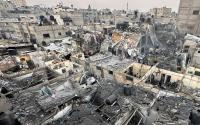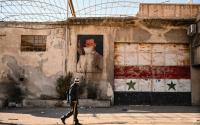The terrible human cost of Bush and Blair's military adventure: 10,000 civilian deaths
8 February 2004David RandallMore than 10,000 civilians, many of them women and children, have been killed so far in the Iraqi conflict, The Independent on Sunday has learnt, making the continuing conflict the most deadly war for non-combatants waged by the West since the Vietnam war more than 30 years ago.The passing of this startling milestone will be recorded today by Iraq Body Count, the most authoritative organisation monitoring the human cost of the war. Since the invasion began in March, this group of leading academics and campaigners has registered all civilian deaths in Iraq attributable to the conflict. They do this in the absence of any counts by US, British, or Baghdad authorities.Iraq Body Count's co-founder, John Sloboda, said: "This official disinterest must end. We are now calling for an independent international tribunal to be set up to establish the numbers of dead, the circumstances in which they were killed and an appropriate and just level of compensation for the victims' families."His call was backed by Bob Marshall Andrews, Labour MP for Medway. He said: "These are figures which are airbrushed out of the political equation and yet are central to whether it is possible to create a stable and democratic Iraq."Iraq Body Count said last night that deaths are only recorded by them when reported by at least two media outlets. Its leading researcher Hamit Dardagan said that its careful, but necessarily incomplete, records are in contrast to "the official indifference" to counting either the Iraqi lives lost or those blighted by injuries.Neither the US or British military, nor the Coalition Provisional Authority have kept a record of Iraq civilian or military casualties, and Washington and London have both rejected calls for them to compile such totals.This attitude extends also to the provisional Iraqi government. Until late last year, an official at the Iraqi Health Ministry, a Dr Nagham Mohsen, was compiling casualty figures from hospital records. But, according to a barely noticed Associated Press report, she was, in December, ordered by her immediate superior, director of planning Dr Nazar Shabandar, to stop collating this data. The health minister Dr Khodeir Abbas denied that this order was inspired or encouraged by the US-led Coalition Provisional Authority.Several other groups have attempted to make educated guesses of the war's true total of dead and injured. Among them is Medact, a organisation of British health professionals, most of whom are doctors. In November it published a report on the war's casualties and health problems in post-conflict Iraq. Omitted from this report was a suggestion that the total dead and wounded on both sides could be as high as 150,000-200,000. But in the end it was felt that the lack of scientific basis for this figure would undermine a carefully worded report.One of the issues confusing any attempt to arrive at an accurate figure for the war's toll is the unknown number of Iraqi military who died. This is in marked contrast to the precise records of coalition service fatalities and injuries, which are kept by service arm, age, circumstance, and, in the case of wounded, by severity. Meanwhile, no one knows Iraqi military deaths to the nearest 20,000. Iraq Body Count concentrates on quantifiable civilian deaths.On its website, the organisation says: "So far, in the 'war on terror' initiated since 9/11, the USA and its allies have been responsible for over 13,000 civilian deaths, not only the 10,000 in Iraq, but also 3,000-plus civilian deaths in Afghanistan, another death toll that continues to rise long after the world's attention has moved on."Elsewhere in the world over the same period, paramilitary forces hostile to the USA have killed 408 civilians in 18 attacks worldwide. Adding the official 9/11 death toll (2,976 on 29 October 2003) brings the total to just under 3,500."Additional research by Caroline GrantMunitions that ended up in the hands of childrenAli Abdul-Amir was one of many Iraqi civilians injured or killed by munitions left behind or not cleared by both sides in the conflict. At 2pm on 3 May the eight-year-old put a match to a piece of explosive ordnance outside a school in al-Hay al-Askari, a neighbourhood of Nasiriyah. The explosion left him with severe burns and shrapnel injuries (pictured left). Six days later in Baghdad, Muhammad Keun Jiheli, 16, brought a piece of ordnance home to use for cooking fuel. An explosion killed four members of his family. Muhammad suffered burns over 72 per cent of his body, and Jamil Salem Hamid, also 16, received burns over 54 per cent of his body.Iraqi forces left behind more than 600,000 tons of munitions. Many had been stored in civilian areas, and were not secured or cleared by coalition forces quickly enough to prevent casualties. The town of al-Hilla was the worst affected by cluster submunitions used in battle that failed to explode on impact as intended. Easily discovered and picked up by children, they were still causing death or injury months after the conflict ended.Research by Bonnie Docherty, Human Rights WatchUS air raid on Saddam's half-brother kills civiliansFour-month-old Dina Jabir was the only survivor when American bombs fell on the family home. Her father Zaid Ratha Jabir, 36, an engineer, and his family returned to their home in al-Karrada, Baghdad, on the night of 7 April to gather some belongings. They had been staying a mile away with Dina's great-uncle, Sa'dun Hassan Salih, shown here holding the baby. A strike levelled the Jabir home just after 9pm, killing six people. Dina was found the next day in a neighbour's yard. She had broken arms and legs, shrapnel in her skull and internal injuries, but was alive and would recover. The intended target, Saddam's half-brother Watban Ibrahim Hasan, was captured alive a week later.Family wiped out by British cluster bombs in BasraBritish forces caused dozens of civilian casualties when they used ground-launched cluster munitions in and around Basra, including a strike in the neighbourhood of Hay al-Zaitun on 25 March. Jamal Kamil Sabir, 25, lost his right leg to a blast while crossing a bridge with his family. His nephew took shrapnel in his knee and his wife still had shrapnel in her left leg two months later because doctors were afraid to remove it while she was pregnant. Submunitions had also fallen on al-Mishraq al-Jadid on 23 March, killing Iyad Jassim Ibrahim, 26, sleeping in the front room of his home, and 10 relatives with him.






